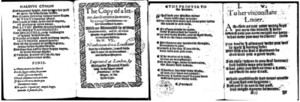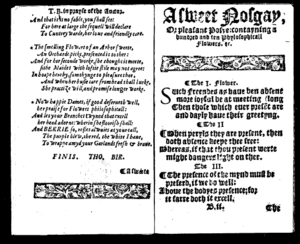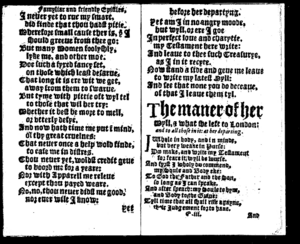Isabella Whitney facts for kids
Isabella Whitney (born around 1546 to 1548, died after 1624) was a very important English writer. Many people believe she was the first woman in England to write and publish her own original poems that weren't about religion. She was a true pioneer for women writers!
Contents
Early Life
Isabella Whitney was born in Cheshire, England. Her family was part of the well-known Whitney family. When she was born, her family lived in Coole Pilate near Nantwich. In 1558, her family moved to a farm in Ryles Green, Audlem.
Isabella was the second of seven children. She had an older brother named Geoffrey Whitney, four sisters (Anne, Margery, Mary, and Dorothea), and a younger brother named Brooke. George Mainwaring, who is mentioned in one of her books, was a friend from her childhood. Her brother, Geoffrey Whitney, was also a famous writer. He wrote a book called A Choice of Emblemes and other Devises in 1586.
Life in London and Later Years
Isabella Whitney lived and worked in London for some time. However, around 1573, she lost her job. It seems this happened because of false rumors about her. She tried to keep writing while living in Abchurch Lane, but she didn't have enough money.
She reached out to friends and family for help, but no one could support her. Because she couldn't support herself, she went back to her family's home in Ryles Green.
Later, around 1580, Isabella married Richard Eldershaw, a doctor from Audlem. They had two children, Marie and Edmund. Isabella's brother, Geoffrey, mentioned her, her children, and her husband in his will in 1601. He left Isabella some silver, perhaps because he knew she was struggling financially and he cared for her.
Isabella is mentioned again in 1624 in the will of her younger brother, Brooke, who was a successful lawyer. By this time, Isabella would have been in her seventies. We don't know exactly when she died, but her children later lived in Stafford.
Becoming a Writer
In early modern England, it was hard for women to get their writing published. Many people thought it was not proper for women to publish their work. Isabella Whitney's writing often talked about these challenges. She also wrote to earn money, which was unusual for women at the time.
Isabella used her uncle's connections to meet people in the printing business. She started writing poems, which were first published without her name, and later with her name or initials. She used popular writing styles but changed them to challenge how men and women were expected to behave in society.
When she lost her job, she turned to writing to support herself. Richard Jones, a rising member of the Stationers Company (a group that controlled printing), helped her. In 1567, Jones published a small collection of her poems. This collection was called The Copy of a letter, lately written in meeter, by a yonge Gentilwoman: to her vnconstant Louer. With an Admonition to al yonge Gentilwomen, and to all other Mayds in general to beware of mennes flattery. These four poems were written as letters and talked about relationship problems. They showed different and sometimes surprising ideas about how men and women should act as lovers. Isabella used these poems to highlight what she saw as unfairness in society.
Her book A Sweet Nosegay was published in 1573. In this work, she criticized the general situation of women, not just in relationships. She was inspired by Hugh Plat's book Floures of Philosophie (1572). Isabella took some of his wise sayings about love, suffering, friendship, and sadness, and added a woman's point of view. Many people call her ideas "proto-feminist," meaning they were early thoughts about women's rights.
After this section, she included "letters" to family and friends to discuss her themes. The book ends with her most famous work, Wyll. This poem shows her detailed knowledge of London at the time. She used a popular style called a "mock will" to comment on society.
In 1578, The Lamentacion of a Gentilwoman was published, and many believe Isabella wrote it. It was written after the death of a gentleman named William Gruffith. We don't know who he was, but the poem is thought to be hers.
Another work, Ovidius Naso His Remedie of Love, was published in 1600 and is also thought to be by Whitney. This book includes a translation of a Roman poem and some letters. One of these letters is believed to be Isabella's work. It is written from the perspective of Aeneas and is addressed to Dido, the queen of Carthage who was left behind by Aeneas. These characters often appeared in Isabella's writings.
Main Works
- The Copy of a letter, lately written in meeter, by a yonge Gentilwoman: to her vnconstant Louer. With an Admonitio to al yonge Gentilwomen, and to all other Mayds in general to beware of mennes flattery (1567).
- This was Isabella's first published work. It contains four poems about love. Two are from a woman's point of view, and two are from a man's.
- The book is a response to a former lover who married someone else. It might be a made-up story rather than a real one.
- The only copy of this book is kept at Oxford's Bodleian Library.
-
-
- “I.W. to her Unconstant Lover”
- “The Admonition by the Auctor, to all Young Gentlewomen.”
-
- A Sweet Nosegay (1573).
- This was Isabella's second major work. She was inspired by Hugh Plat's Floures of Philosophie (1572). She joked that Plat planted the ideas, but she "harvested" and arranged them.
- This book came out when more people, not just the rich, could buy books. This meant new ideas and ways of living were spreading. Isabella's book added to this knowledge.
- London was changing a lot, and Isabella used Plat's ideas to help her readers stay "healthy" in a world she saw as morally "infected."
-
- A Sweet Nosegay shows Isabella's unique style and independence. In this book, she changes from a woman sad about love to a single woman writing about London.
- The book also talks about the suffering and illness that made her leave London. She wrote that she was warned to avoid streets "contaminated" with disease. This could mean real sickness, but also the "corrupted" world of public printing.
- Even though she returned home, she still managed to send her work out into the world. She knew the challenges of being a woman in public print, but she took on this burden to help others.
- Through these poems, we learn things about Isabella's life. She mentions having two younger sisters who work as servants. She also says she is single, which is why she is allowed to write. She mentions losing her job and struggling financially.
- She also shows her independence by saying she will earn money by writing and selling her books. She highlights the feeling of being alone during this time and calls for change.
- "The Author to the Reader" – Isabella included this poem to update readers on what she had been doing since her last book in 1567.
- She then printed "110 quatrains of advice" she chose from Plat's book. She picked poems about love, friendship, and poverty, and rewrote them to be more inclusive for women.
- “A Care-full Complaint by the Unfortunate Author” – Here, Isabella shares her feelings with Dido, a queen from ancient stories, who fell in love with a man who wasn't worthy. Isabella also hints that she thought about ending her life, like Dido, but in a playful way. This makes readers wonder if she was serious or just using a poetic trick.
- “Farewell to the Reader” – In this ending to A Sweet Nosegay, Isabella asks readers to forgive her for using Plat's ideas. She also asks them to bless both her and Plat. What made her special was that she was one of the few writers of her time who actually gave credit to the person who inspired her.
- “Her Will and Testament” (1573).
- This was Isabella's "mock will," where she said goodbye not only to her friends and family but also to the city of London.
- A scholar named Betty S. Travitsky said that this "lively... mock legacy brings contemporary London alive." It shows how well Isabella described London life, almost like a play. This made Isabella a trendsetter.
-
-
- “A Communication which the Author had to London, Before She made Her Will” – In this part, Isabella says farewell to London. She describes the city very clearly, like a "mock testament." She expresses her unhappiness with London's cruelty and how it ignored her, but she also shows sadness about leaving. She describes the city like a difficult romantic relationship. This piece also shows her feeling of being abandoned.
- “The manner of her will, and what she left to London and to all those in it at her departing”
- This part starts by describing London as charming. But then the tone changes as she talks about the darker parts of London, like prisons and hospitals. She mentions her own poverty, saying she's too poor to even be put in prison for debt.
- Throughout the mock will, she pretends to leave money and things to people in London, as well as her family and friends. But it's ironic because she doesn't own any of those things, so she's actually giving nothing.
- Professor Wendy Wall says this will was Isabella's way of trying to control her difficult situation. It was an "act of possession by dispossession," meaning she gained control by pretending to give things away.
- This piece is like a guide to London in the 1500s. It was popular with women readers, and someone even imitated it after Isabella died.
-
- “The Lady Beloved Exclaimeth of the Great Untruth of her Lover” (1578)
- “The Lamentation of a Gentlewoman upon the Death of Her Late-Deceased Friend, William Gruffith, Gentleman” (1578).
- While people have debated who wrote this poem, scholar Randall Martin believes Isabella Whitney is the author. He looked closely at the language and style to make his argument.
- “Ovidius Naso His Remedie of Love" (1600).
- In this work, Isabella Whitney returns to the story of Dido. However, perhaps because of her own life experiences, the characters she describes are more mature.
Writing Style
Isabella Whitney was a very unusual and forward-thinking woman for the 1500s. Most women writers at that time were wealthy and well-connected, but Isabella was not. Because of this, she often wrote about money problems and criticized traditional gender roles in her poems. She also hoped her writing would earn money for her and her family.
Some critics say Isabella's poetry showed her as an "outsider" who openly followed her own interests. She was often direct in her writing. Common themes in her works included women in difficult situations and romance. During her time, women were expected to be modest and controlled, but Isabella did the opposite.
She was one of the few writers who apologized for borrowing ideas and actually named her sources. Even more importantly, she was one of the first to give a "public voice to breezily expressed secular concerns," meaning she wrote openly about everyday, non-religious topics. Scholars also say she was the first writer, male or female, to care about using gender-neutral language, which was very ahead of her time.
Many critics believe Isabella Whitney's works included details from her own life. For example, in her poems A Communication Which the Author had to London before she Made Her Will and The Manner of Her Will, and What She Left to London and to All Those in it, of her Departing, she describes herself as having little money and spending time among the poor and imprisoned in London.
Her most creative poems were her "verse epistles," which were poems written as letters, many of them to female relatives. She addressed her "Will and Testament" poem to the city of London, making fun of it as a heartless and greedy friend. These works were written in a popular style called ballad metre and had clever, lively descriptions of daily life. It seems she published her works mainly to earn a little extra money. She even wrote in a letter to her sister, "til some houshold cares mee tye, / My bookes and Pen I will apply," suggesting she wanted a professional writing career to support herself while unmarried.
Isabella Whitney was a pioneer for women poets. While some of her writing techniques were common for male writers of her time, as a woman, she was a trendsetter. She published her poetry when it was not common for women, especially those not from noble families, to do so. Her writing also included controversial topics like social class and political comments, along with clever humor. Her work was available to both the rich and the middle class. Her two most famous works are The Copy of a Letter (around 1567) and A Sweet Nosegay (1573).
Writings
- The Copy of a Letter, Lately Written in Meter, by a Young Gentlewoman To her Unconstant Lover (From The Copy of a Letter, 1567)
- The Admonition by the Auctor, To All Young Gentlewomen: And to all other maids being in love (From the Copy of a letter, 1567)
- The Author to the Reader (From A sweet Nosgay, 1573)
- A Sweet Nosgay, or Pleasant Poise: Containing a Hundred and Ten Philosophical Flowers (From A sweet Nosgay, 1573)
- A Soueraigne Recipt (From A sweet Nosgay, 1573)
- A Farewell to the Reader (From A sweet Nosgay, 1573)
- To Her Brother. G. VV. (From A sweet Nosgay, 1573)
- To Her Brother. B. VV. (From A sweet Nosgay, 1573)
- An Order Prescribed, by IS. VV. To Two of her Younger Sisters in London (From A sweet Nosgay, 1573)
- To Her Sister Mistress A.B. (From A sweet Nosgay, 1573)
- To Her Cousin F. VV. (From A sweet Nosgay, 1573)
- A Care-full Complaint by the Unfortunate Author (From A sweet Nosgay, 1573)
- I Reply to the Same (From A sweet Nosgay, 1573)
- IS. VV. TO C. B. in Bewaylynge her mishaps (From A sweet Nosgay, 1573)
- To my Friend Master T.L. Whose Good Nature: I See Abusde (From A sweet Nosgay, 1573)
- IS. VV. Being Wery of Writing, Send this for Answer (From A sweet Nosgay, 1573)
- The Author Upon Her Friends Procurement is Constrained to Depart (From A sweet Nosgay, 1573)
- The Manner of her Will & What She Left to London: And to All Those in it: at her departing (From A sweet Nosgay, 1573)
- A Communication which the Author Had to London, Before She Made Her Will
- The Lady-Beloved Exclaimeth of the Great Untruth of her Lover
- The Lamentation of a Gentlewoman upon the Death of Her Late-Deceased Friend, William Gruffith, Gentleman (1578)
- Will and Testament (1573)
- Ovidius Naso His Remedie of Love (1600)
Timeline of Events
- Around 1548: Isabella Whitney is born in Coole Pilate, Cheshire.
- After 1558: Isabella moves to London.
- 1566-1572: Isabella loses her job during these years.
- 1566/1567: Isabella sells two of her poems to Richard Jones.
- 1572: Richard Jones publishes 'A Sweet Nosgay'.
- 1573: Whitney is living in Abchurch Lane, London, and prepares to return to Cheshire.
- 1577: William Gruffith dies.
- 1601: Geoffrey, Isabella’s brother, dies and mentions "Sister Eldershae" (Isabella) in his will.
- 1624: Brooke, Isabella’s younger brother, dies and mentions "my sister Isabell" in his will.
Related Pages
 | Aurelia Browder |
 | Nannie Helen Burroughs |
 | Michelle Alexander |




